Still confused
Chu Ward is a fruit growing area with a large area and diverse varieties such as lychee, grapefruit, orange, star apple, etc. Therefore, there is a high demand for using agricultural land for commercial and service purposes, especially building warehouses and preserving agricultural products after harvest to improve consumption efficiency and product quality. For example, An Phat Production, Trade and Service Cooperative, established in 2018, is currently cultivating more than 10 hectares of fruit trees and providing plant varieties. Each year, this unit purchases and distributes thousands of tons of agricultural products.
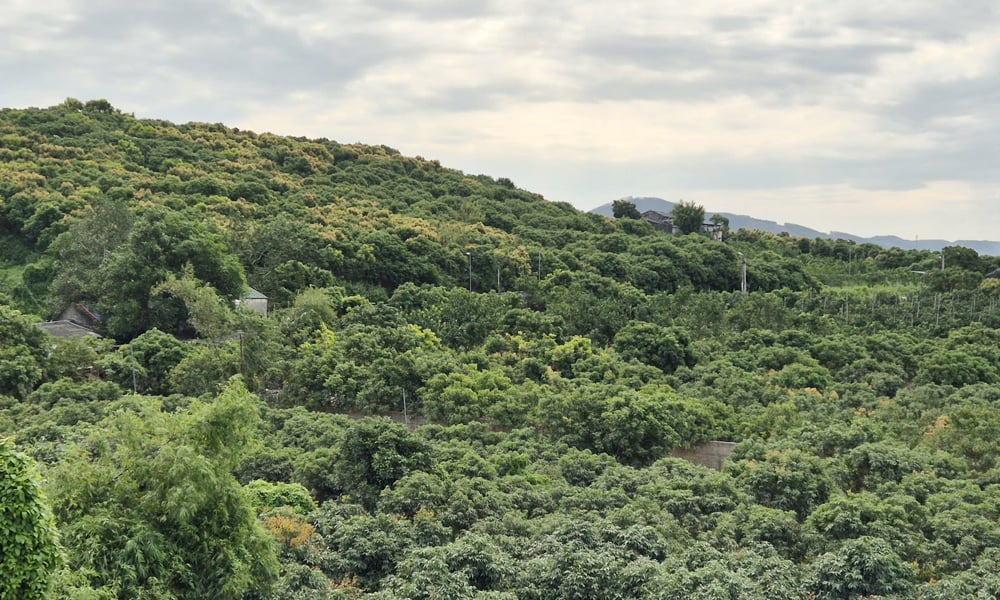 |
With a large area of fruit trees, Chu ward residents need to build warehouses to preserve agricultural products. |
According to Ms. Le Thi Huong, Director of the Cooperative, with such a large output, building a warehouse is necessary to maintain the quality of agricultural products and expand the consumption market. The Cooperative hopes to receive specific guidance from the authorities on multi-purpose agricultural land for better operation.
| According to the leader of the Department of Agriculture and Environment, agricultural land users are allowed to construct works according to the provisions of Clause 3, Article 178 of the Land Law and Clause 1, Article 9 of Decree No. 112/2024/ND-CP of the Government . |
The representative of Chu ward's leadership informed that not only An Phat Cooperative but also many cooperatives and agricultural production households in the area are in need of building warehouses to preserve agricultural products right on agricultural land to serve production. However, the implementation process in the locality is facing many difficulties. The main reason is that the detailed zoning plan of the ward currently has very few areas planned for commercial and service land. This makes it difficult for households and individuals to change the purpose of land use from agricultural to commercial.
The 2024 Land Law has opened up a new direction by allowing the use of agricultural land in combination with commercial and service purposes without having to carry out procedures to change land use purposes. Specifically, Article 218 of the Law clearly stipulates the use of land for multiple purposes. In which, agricultural land can be used simultaneously for activities such as commerce, services, animal husbandry, medicinal plant cultivation, etc., provided that it does not change the land type according to legal classification, does not affect national defense, security, ecosystems, environmental landscape and land use rights of adjacent plots. Land users must also fulfill their financial obligations and comply with relevant legal regulations.
According to Vice Chairman of Chu Ward People's Committee Mac Anh Tuan, based on the provisions of the 2024 Land Law, households and individuals can use agricultural land for commercial, service, livestock or medicinal plant cultivation purposes. However, there are currently no specific instructions on the scale and structure of construction works allowed, as well as whether or not a construction permit is required. This makes it difficult for the locality to appraise and approve qualified dossiers. "Chu Ward People's Committee has sent a document requesting the Department of Agriculture and Environment to review, study and issue specific instructions so that the locality has a basis to comply with legal regulations," said Mr. Mac Anh Tuan.
Timely removal of obstacles
In addition to Chu Ward, many localities in the province are also facing difficulties in implementing construction works to serve production on agricultural land. In Kien Lao Commune, Mr. Nguyen Anh Sac's household currently owns more than 8,000 m² of agricultural land and wishes to build a livestock farm of about 4,000 m². According to specialized agencies, with this scale, the project is classified as concentrated livestock farming according to the Law on Livestock, requiring the establishment of a land use plan and an environmental protection project. Currently, the authorities are guiding people to fully implement related regulations.
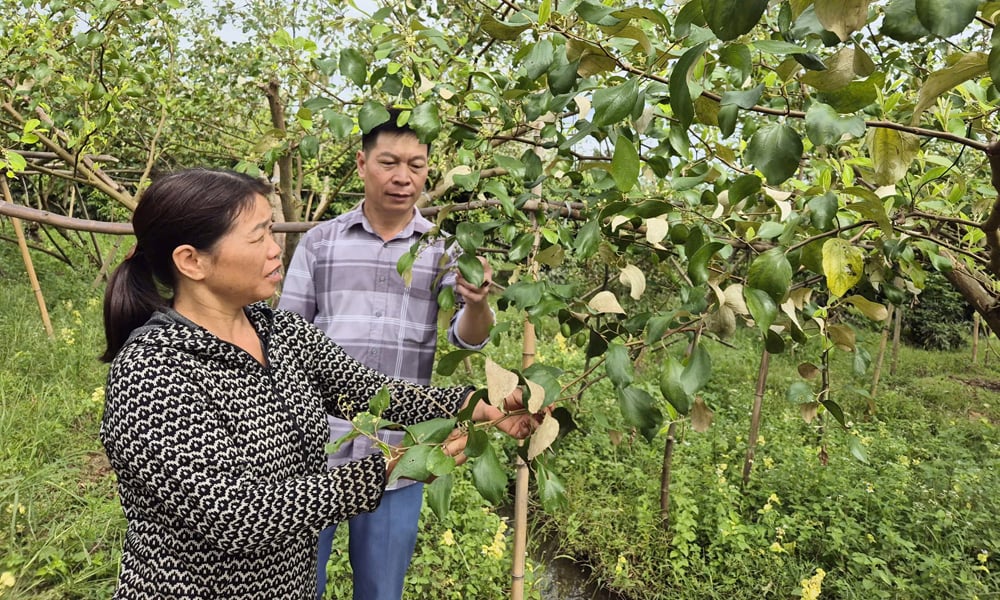 |
Luc Ngan commune's professional staff guides people on how to take care of apple trees. |
The issuance of new regulations on the use of multi-purpose agricultural land is considered an important step in land policy reform, contributing to optimizing land resources and improving economic efficiency for the people. To ensure compliance with regulations as well as avoid the misuse of land use policies, on November 29, 2024, the Provincial People's Committee issued detailed regulations on the construction of works directly serving agricultural production in the province. According to the leader of the Department of Agriculture and Environment, agricultural land users are allowed to construct works according to the provisions of Clause 3, Article 178 of the Land Law and Clause 1, Article 9 of Decree No. 112/2024/ND-CP of the Government.
Specifically, for concentrated rice-growing land of 50 hectares or more, people are allowed to use a maximum of 0.1% of the area (not exceeding 1,000 m²) to build works such as warehouses, processing areas, product displays, etc., provided that they do not affect irrigation works, dykes and intra-field traffic. For other types of land such as land for perennial crops, aquaculture land, land for annual crops and other agricultural land, people can build level IV works if the land scale reaches 0.5-1 ha.
Bac Ninh is a key agricultural locality with a large scale of land use. Removing obstacles in the process of using multi-purpose agricultural land is one of the important factors promoting agricultural economic development. In a recent survey of some fruit growing and processing areas, comrade Pham Van Thinh, member of the Provincial Party Standing Committee, Vice Chairman of the Provincial People's Committee, Head of the Provincial National Assembly Delegation, affirmed that the construction of works on agricultural land to serve on-site production and exploit multi-purpose land is a legitimate need, reflecting the trend of agricultural development associated with modern trade. Therefore, competent agencies need to carefully study the guiding documents, ensuring the effective exploitation of agricultural land, bringing practical benefits to the people.
Source: https://baobacninhtv.vn/su-dung-dat-nong-nghiep-da-muc-dich-huong-dan-con-the-khai-thac-hieu-qua-tiem-nang-dat-dai-postid426245.bbg




![[Photo] Prime Minister Pham Minh Chinh attends the closing ceremony of the exhibition of national achievements "80 years of the journey of Independence - Freedom - Happiness"](https://vphoto.vietnam.vn/thumb/1200x675/vietnam/resource/IMAGE/2025/9/15/a1615e5ee94c49189837fdf1843cfd11)
![[Photo] General Secretary To Lam attends the National Conference to disseminate and implement 4 Resolutions of the Politburo](https://vphoto.vietnam.vn/thumb/1200x675/vietnam/resource/IMAGE/2025/9/16/70c6a8ceb60a4f72a0cacf436c1a6b54)

![[Photo] General Secretary To Lam chaired a working session with the Standing Committee of the Party Committee of the Ministry of Foreign Affairs](https://vphoto.vietnam.vn/thumb/1200x675/vietnam/resource/IMAGE/2025/9/15/f26e945b18984e8a99ef82e5ac7b5e7d)







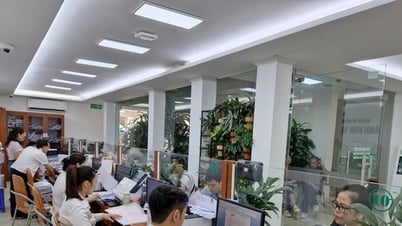

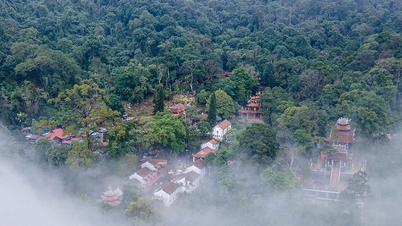


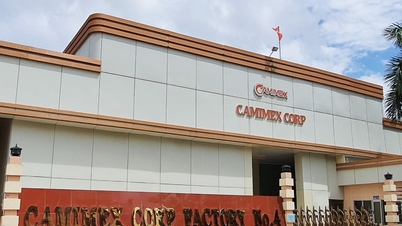














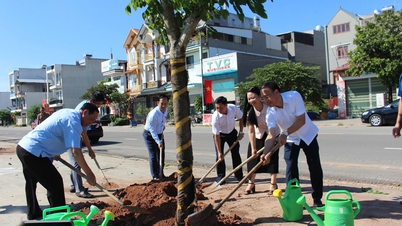
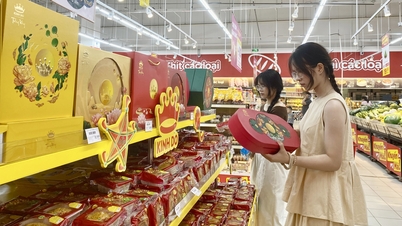




![[Photo] National conference to disseminate and implement 4 Resolutions of the Politburo](https://vphoto.vietnam.vn/thumb/1200x675/vietnam/resource/IMAGE/2025/9/16/5996b8d8466e41558c7abaa7a749f0e6)
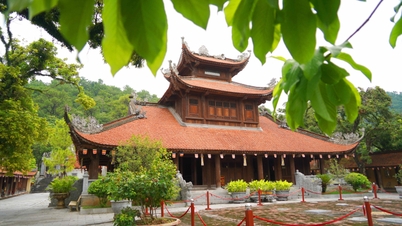























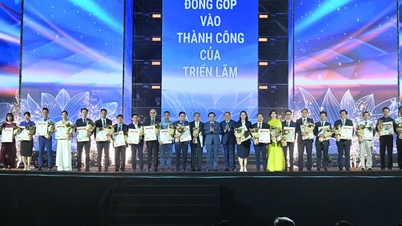
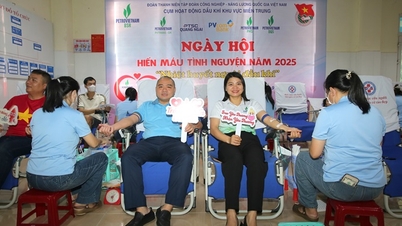


























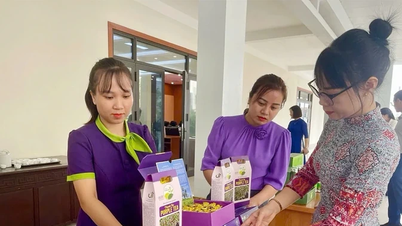











Comment (0)